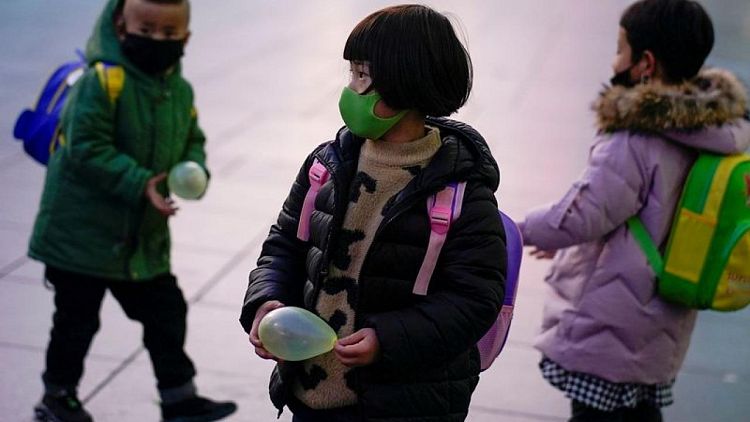SHANGHAI - China announced on Monday that couples would be allowed to have up to three children, up from the current limit of two, in a bid to reverse a rapid decline in new births.
Following are reactions from academics, economists and members of the public:
ZHANG XINYU, 30-YEAR-OLD TOURIST AND MOTHER OF ONE CHILD FROM ZHENGZHOU
"It's mostly women bearing the responsibility of raising children, for the most part. And this society hasn't provided women with much support. So actually, if men could do more to raise the child, or if families could give more consideration for women who had just had children, actually a lot of women would be able to have a second child. Because it would be a bit better if a child has siblings. But thinking of the big picture, realistically, I don't want to have a second child. And a third is even more impossible."
GAN YUYANG, 30-YEAR-OLD TOURIST AND PARENT OF ONE CHILD
"Nowadays young people have to buy a house. This amount of pressure is already huge. And then you have to consider the cost (of the child's) education, etc. I think this sort of policy will be difficult to implement."
JEAN-PIERRE CABESTAN, PROFESSOR AT BAPTIST UNIVERSITY OF HONG KONG
"Unless the government introduces real incentives, so providing special allowances to couples who have three children, like, you know, reductions for transportation, and other incentives, I don't think that Chinese couples are going to have more kids in the coming years."
ZHIWEI ZHANG, CHIEF ECONOMIST AT PINPOINT ASSET MANAGEMENT:
"The immediate impact is likely to be positive but small on the macro level. The long term impact depends on if the government can successfully reduce the cost for raising children – particularly education and housing."
HAO ZHOU, SENIOR ECONOMIST ASIA, COMMERZBANK
"If relaxing the birth policy was effective, the current two-child policy should have proven to be effective too. But who wants to have three kids? Young people could have two kids at most. The fundamental issue is living costs are too high and life pressures are too huge."
SHUANG DING, CHIEF ECONOMIST AT STANDARD CHARTERED
"This is without a doubt a step in the right direction, but still it's a bit timid. The government could fully liberalise the birth policy. Even with a fully liberalised policy, birth rates may not increase substantially, so there's no need for a still restricted policy. A fully liberalised birth policy should have been implemented at least five years ago, but it's too late now, although it's better late than never. "
YIFEI LI, SOCIOLOGIST, NYU SHANGHAI
"I feel the proposal fails to recognise the reasons behind the decline in fertility ... People are held back not by the two-children limit, but by the incredibly high costs of raising children in today's China. Housing, extracurricular activities, food, trips, and everything else adds up quickly. An effective policy should have provided more social support and welfare. Raising the limit itself is unlikely to tilt anyone's calculus in a meaningful way, in my view.
"The challenges are so multi-faceted that it requires carefully coordinated actions in multiple policy areas to rebuild people's confidence in the future... It is simply not wise to expect citizens to respond to policy changes so robotically."
YE LIU, SOCIOLOGIST, KING'S COLLEGE LONDON
"In my view, it is a numbers game. In reality there is still a lack of concrete policy proposals in addressing three main obstacles that put families (in particular women) off from having more children.
"The three obstacles are childcare cost, employment discriminations against women of childbearing and child rearing years and a lack of safeguarding children's welfare in various industries and private childcare providers."
XU HONGCAI, DEPUTY DIRECTOR OF THE ECONOMIC POLICY COMMISSION AT CHINA ASSOCIATION OF POLICY SCIENCE
"This is a good and major step, but it could be difficult to reverse the declining birth rate. We should have other policies to encourage childbearing. The fertility rate is just 1.3, which is too low and this is a dangerous signal ... We are sticking to gradual reforms and making progress while maintain stability.
"It's okay to allow each family to have three children, which is more acceptable. It's possible that some rural families want to have more children (if we fully remove controls): that could be troublesome."
SIMONE TAGLIAPIETRA, RESEARCH FELLOW AT BRUSSELS-BASED THINK TANK BRUEGEL
Tagliapietra said there are four key drivers of China's greenhouse gas emissions: population size, GDP per capita, energy intensity of GDP and emissions intensity of energy consumption. If one driver increases, a bigger decrease in the others drivers would be needed to keep emissions in check.
"As China relaxes its one-child policy, cutting emissions would need to happen by lowering some or all of the other terms," Tagliapietra said.
"The core question is whether the third and fourth term could decline at a sufficient speed to allow the first and the second to remain constant – or even increase."












